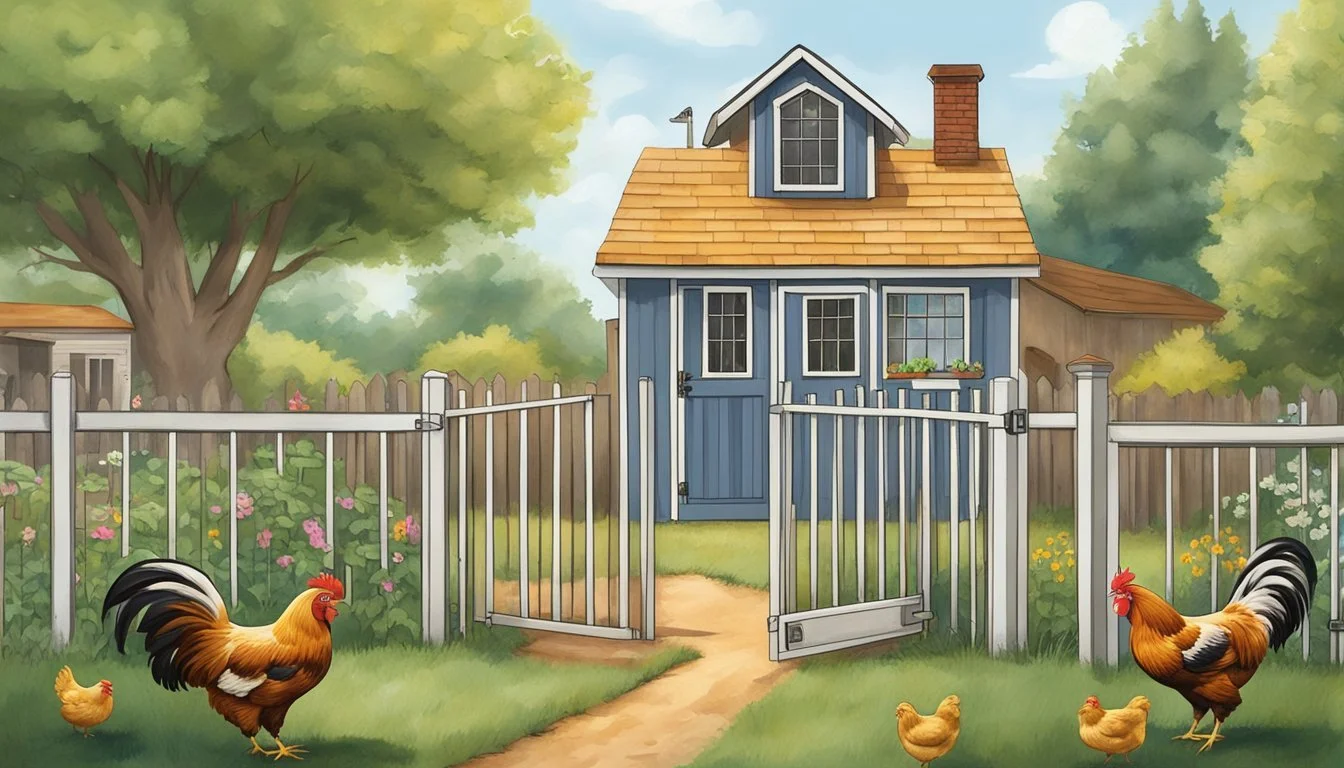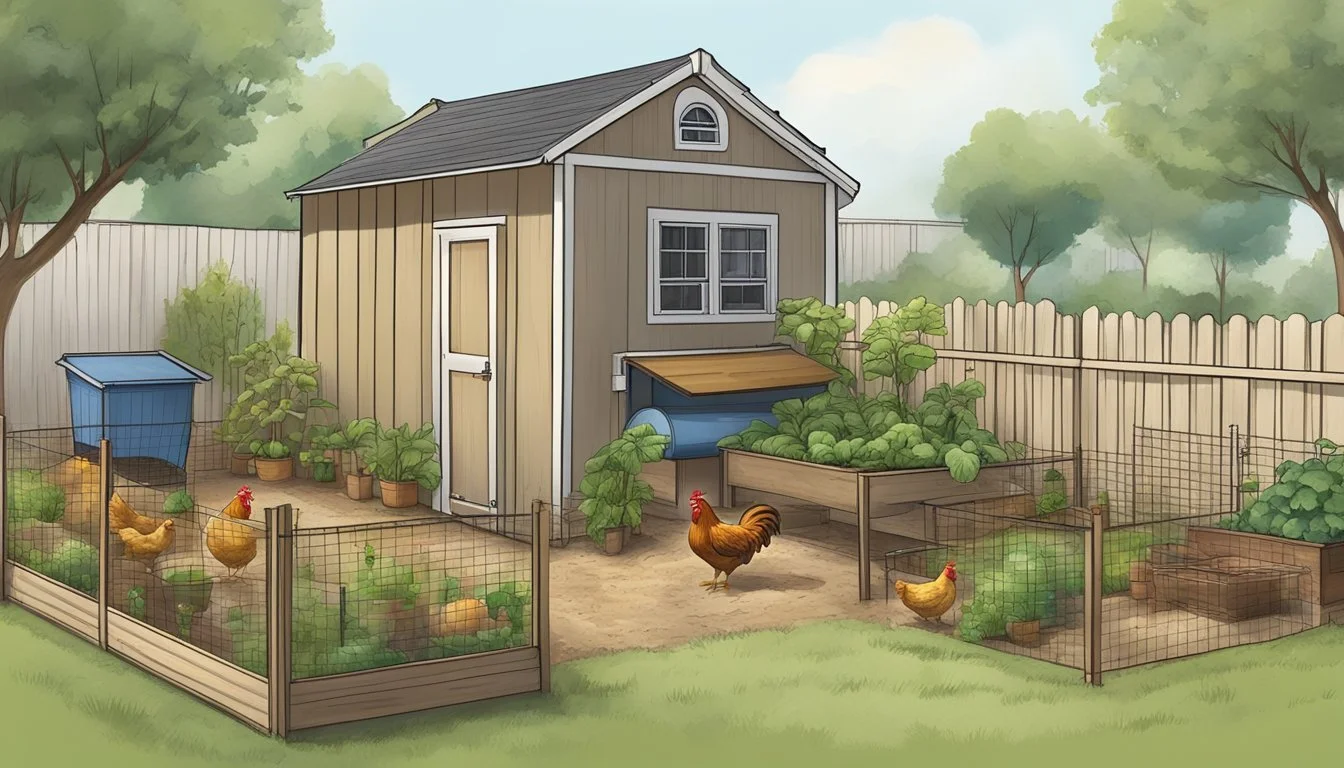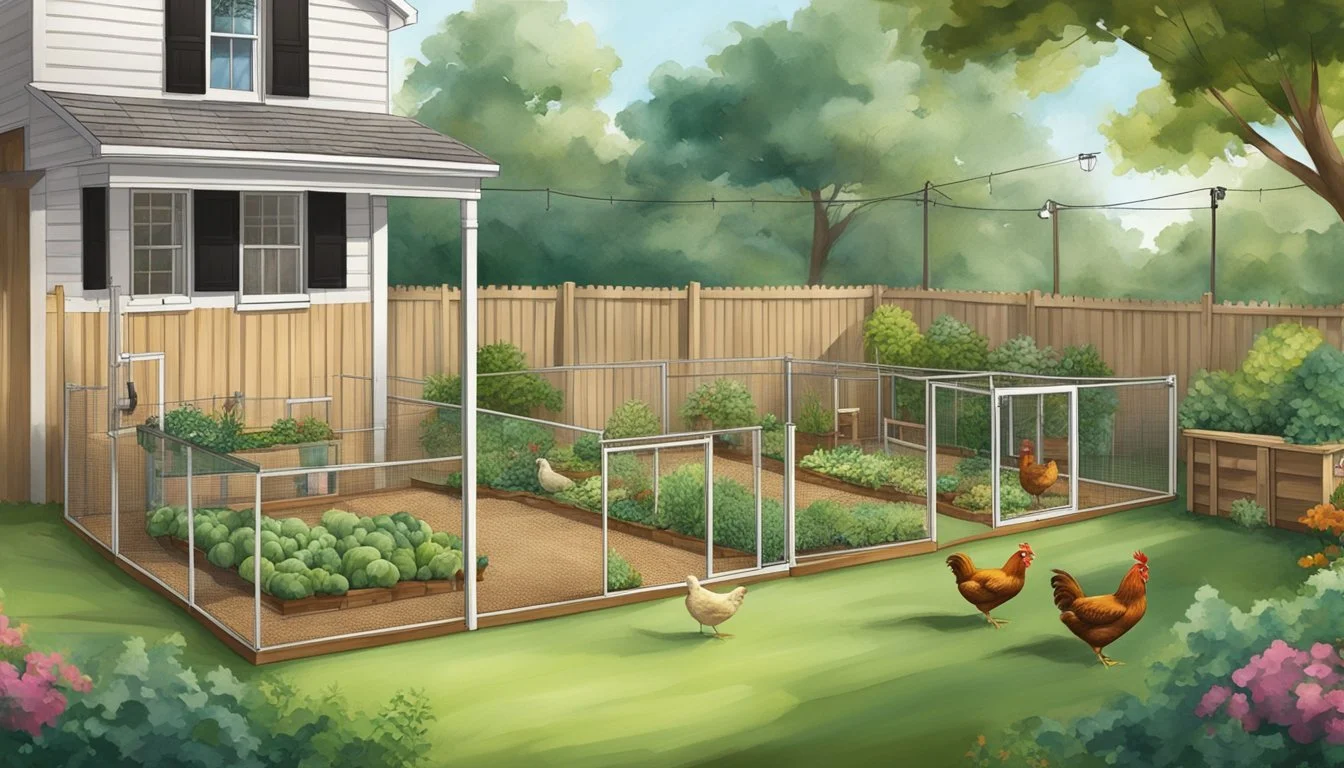Keeping Backyard Chickens in Norfolk, VA
A Guide to Urban Poultry Farming
Keeping backyard chickens is an increasingly popular practice among residents in Norfolk, Virginia, combining the joys of pet ownership with the practical benefits of fresh eggs. In this coastal city, the local government provides a structured framework for residents to participate in urban agriculture through the keeping of chickens in their backyards. This initiative supports sustainability and food independence, and it also enriches the community's connection to nature and farming practices within an urban setting.
Residents must navigate a set of regulations designed to ensure both the well-being of the chickens and the consideration of neighbors. In Norfolk, a permit application is necessary, and those interested must adhere to specific requirements set by the city. These include obtaining written consent from property owners if applicable, and preparing a detailed plan for the chicken coop that complies with the city's regulations on the structure's placement and construction.
Norfolk's guidelines advocate for responsible chicken keeping, with clear stipulations on the number of chickens allowed, the prohibition of keeping roosters in some cases due to noise concerns, and the necessary sanitary standards to maintain. It's important for Norfolk inhabitants to acquire the most current information from municipal officials or the city's official documentation to ensure compliance and avoid any potential issues.
Understanding Local Chicken Ordinances
Navigating the local chicken ordinances is crucial for residents of Norfolk, VA, who wish to keep backyard chickens. It is essential to comply with city and state regulations for a harmonious and lawful chicken-keeping experience.
Overview of Norfolk Chicken Laws
In Norfolk, individuals are permitted to keep chickens, but they must adhere to specific city ordinances designed to ensure the well-being of the chickens and harmony within the community. Key points within these local laws include the requirement for a permit before setting up a backyard coop and restrictions on the types of animals allowed within city limits.
Permit Application: Residents must apply for a permit, which includes obtaining written consent from the property owner if the resident is not the owner themselves.
Coop Requirements: The chicken coop must meet the city's detailed plan requirements, focusing on structural soundness and adherence to set dimensions.
Number Restrictions: There is a limit on the number of chickens that can be kept on a property, emphasizing the importance of preventing overcrowding.
Prohibited Animals: Some animals are prohibited within city limits, and violators can face legal action.
Comparing Hampton Roads and Virginia Chicken Ordinances
The chicken ordinances in Norfolk are part of a larger framework that encompasses Hampton Roads and the state of Virginia. While specific local chicken laws may vary from one municipality to another in the Hampton Roads region, Virginia's state regulations provide a foundation of legal standards for keeping chickens.
Key Similarities: Many areas in Hampton Roads, including Norfolk, require permits and consent for chicken keeping, with an emphasis on maintaining the health and safety of both chickens and residents.
Local Variations: Each city may have different stipulations regarding coop construction, the number of chickens allowed, and whether roosters are permitted. It is vital that residents consult their city's ordinances in addition to understanding Virginia's broader legal perspectives on backyard poultry.
By staying informed about both local and state regulations, prospective and current chicken keepers in Norfolk can ensure they remain compliant while enjoying the benefits of backyard chickens.
Legal Requirements for Keeping Chickens
In Norfolk, Virginia, residents interested in keeping backyard chickens must adhere to specific legal requirements to ensure compliance with municipal codes. The following information details the permit process, restrictions, and property line considerations required by the city.
Permit Process for Norfolk Residents
Residents must obtain a permit before keeping chickens on their property. This process involves submitting an application to the City of Norfolk. The application must include the consent of the property owner (if the resident is not the owner) and a detailed plan of the chicken coop that meets the city's requirements. The City’s official address for correspondence is 810 Union Street, Norfolk, VA 23510, with the contact phone number being 757-664-6510.
Restrictions and Limitations
The city imposes certain restrictions on the keeping of chickens:
Only a specified number of chickens may be kept, usually determined by lot size and local zoning regulations.
Roosters are typically prohibited to avoid noise disturbances.
The coop and run area must be kept clean and debris-free to prevent disease.
Property Line and Neighbor Considerations
When constructing chicken coops, Norfolk requires specific property line setbacks:
Setbacks: Coops must be located in the rear yard and maintain a minimum setback of 3 feet on lots less than 65 feet in width and 5 feet on lots 65 feet or wider.
Neighbor Approval: Although not explicitly stated, obtaining written consent from neighbors can be beneficial and may sometimes be necessary depending on the requirements at the time of application.
Keeping backyard chickens in Norfolk, VA is permissible, provided residents comply with the specified legal requirements and considerations.
Setting Up Your Chicken Coop
When setting up a chicken coop in Norfolk, VA, one must pay close attention to the coop's design, location, run management, and cleanliness to prevent disease. Strategic planning in these areas ensures a safe and healthy environment for the backyard poultry.
Coop Design and Location
The design of the chicken coop should prioritize the protection and comfort of the chickens, taking into account Norfolk's specific climate. It should be sturdy, well-ventilated, and predator-proof. The coop's location must be elevated to avoid flooding and positioned to provide a balance of sunlight and shade. To meet local ordinances, it's important to ensure proper spacing from property lines and neighbors.
Orientation: Position the coop to face south to maximize sunlight exposure.
Ventilation: Include vents or windows to maintain air flow, but prevent drafts.
Security: Use hardware cloth instead of chicken wire for enhanced safety against predators.
Permits: Check with the Norfolk Department of Public Health for necessary permits.
Managing Run Areas
Run areas should be spacious and secure to allow chickens to forage and exercise without the risk of predators. The area around the coop must be fenced adequately with buried barriers to deter digging animals.
Enclosure: The fence should be at least 6 feet tall with an additional foot underground.
Space: Chickens require a minimum of 10 square feet per bird in the run.
Ensuring Cleanliness and Disease Prevention
A clean coop is crucial to prevent the outbreak of diseases and maintain the health of the backyard chickens. Regular removal of waste, provision of fresh food and water, and disinfection are key preventative measures.
Sanitation Schedule: Clean the coop weekly and replace bedding to reduce the likelihood of disease.
Food and Water: Always provide access to clean and fresh food and water.
Disease Awareness: Stay informed about local disease outbreaks such as avian flu and take pre-emptive actions as necessary.
Chicken Care and Management
Proper care and management are essential for the health and well-being of backyard chickens in Norfolk, VA. This involves a balanced diet, clean water, and regular health checks to prevent diseases.
Feeding and Nutrition
Chickens require a balanced diet to maintain good health. The primary components of their diet should include:
Grains: A source of carbohydrates for energy.
Proteins: Essential for growth and egg production.
Vitamins and Minerals: Necessary for vital bodily functions.
One should provide a formulated chicken feed that meets all the nutritional requirements. Feed should be stored in a dry, secure place to prevent contamination or spoilage. Additionally, chickens can benefit from kitchen scraps and garden produce, but these should not constitute the majority of their diet.
Clean water is critical and should be available at all times. Water containers must be cleaned regularly to prevent the growth of algae and bacteria.
Health and Veterinary Care
Chickens are susceptible to various diseases, some of which can be prevented with proper care. Regular observations for signs of illness include changes in eating habits, lethargy, and abnormal droppings. Common chicken diseases include:
Avian influenza
Marek's disease
Coccidiosis
Preventative care includes vaccination and maintaining a clean living environment to reduce the spread of pathogens. It's crucial for owners to have a relationship with a veterinarian who specializes in poultry to ensure timely medical care when needed.
Owners should promptly address any signs of distress or disease as early intervention can prevent the spread of illness to the rest of the flock. Vaccinations and biosecurity measures like controlling visitors' access to the flock and employing pest control strategies are vital components of a preventative health plan.
Community Engagement and Legal Compliance
Keeping backyard chickens in Norfolk, VA requires an understanding of local ordinances and a commitment to community relations. Residents must remain cognizant of both legal parameters and the perspectives of their neighbors to maintain harmony and compliance.
Communication with Neighbors and Community
Residents considering chicken keeping should start by talking with their neighbors. This dialogue serves to inform and sometimes garner support or address concerns that others may have. Clear communication helps to prevent possible complaints and shows a commitment to community harmony.
Key Steps for Residents:
Obtain written consent from the property owner if they are not the homeowner.
Share detailed plans of the chicken coop with adjacent property owners to demonstrate adherence to city requirements.
Discuss any potential concerns, such as noise or maintenance.
Adherence to Noise and Nuisance Regulations
The city of Norfolk imposes regulations to mitigate nuisance and maintain a peaceful environment. Residents must follow specific guidelines to ensure that their chicken coops do not disrupt the community.
Noise Regulations:
While roosters are generally allowed, they may be subject to noise ordinances.
It is essential to consider the placement of coops in relation to neighbors to minimize disturbances.
Nuisance Restrictions:
Coops must be designed and located according to Norfolk’s setback requirements, with a specified distance from the property lines.
Maintenance of the coop and the chickens must be consistent to prevent any sanitary issues or smells that could bother neighbors.
By adhering to these practices, residents ensure they are respectful members of their community and compliant with local laws.
Challenges and Considerations in Urban Poultry Keeping
When it comes to keeping backyard chickens within the city limits of Norfolk, VA, residents must navigate a host of challenges and legal considerations. Urban poultry keeping is appealing for its fresh eggs and the joy of animal husbandry, but it's not as straightforward as one might think.
Legal Restrictions: Norfolk has specific ordinances that regulate the keeping of chickens in urban areas. These regulations often encompass the number of chickens allowed, the prohibition of roosters due to noise concerns, and the requirement of obtaining permits. Before starting, prospective poultry keepers should consult the city's zoning laws to ensure compliance.
Space and Location: Adequate space is crucial for the health and safety of the chickens. There should be considerations for city drainage easements which can affect where coops can be placed. Setbacks from property lines are typically mandated to minimize disturbances to neighbors and to adhere to city codes.
Roosters: The keeping of roosters is frequently restricted within city limits, primarily due to noise issues that can disrupt a neighborhood.
Waste Management: Proper disposal of chicken manure is essential. It should be kept dry to reduce odor and to prevent attraction of pests. Since chicken waste can be high in nitrogen, thoughtful composting is an environmentally responsible way to handle poultry waste without impacting city drainage systems.
Neighborly Considerations: Keeping chickens in an urban setting means close proximity to neighbors who may not appreciate the noises or odors associated with poultry. Maintaining a clean and orderly coop is necessary to foster good relationships and community well-being.
In summary, while urban poultry keeping is feasible in Norfolk, VA, it requires careful consideration of local laws, space planning, waste management, and community relations.
Benefits of Raising Backyard Chickens
Raising backyard chickens in Norfolk, VA, offers numerous advantages to residents. Chief among them is the supply of fresh eggs. Fresh eggs from one's backyard flock are typically more nutritious and flavorful than store-bought alternatives. Moreover, owners have full control over their chickens' diets, ensuring that the eggs are as organic as possible.
Fresh Eggs: Compared to commercially farmed eggs, those from backyard chickens often have brighter yolks and firmer whites, indicating freshness.
Cost Savings: Over time, keeping chickens can be economical, as the cost of chicken feed is often offset by the value of the eggs produced.
The joys of poultry husbandry extend beyond eggs. Chickens provide natural pest control, as they consume insects and weeds in the garden. These birds contribute to a healthier yard through their foraging activities.
Benefit Description Natural Pest Control Chickens eat insects, reducing the need for pesticides. Soil Enhancement Their droppings enrich the soil with nutrients.
Additionally, chickens are generally low-maintenance livestock. They require basic care, such as feeding, watering, and regular coop cleaning. As social creatures, they also offer companionship and educational opportunities for families interested in learning about sustainable living.
In conclusion, raising backyard chickens in Norfolk, VA provides residents with the benefits of fresh eggs, potential cost savings, natural pest control, and the joy of caring for poultry. This fulfilling practice complements a self-sustaining lifestyle and contributes to local food production.
Expanding Your Knowledge and Resources
When venturing into the world of backyard chicken keeping in Norfolk, VA, one's success hinges on gaining proper knowledge and connecting with seasoned chicken keepers. Resources are plentiful, but knowing where to look makes all the difference.
Local Workshops and Educational Opportunities
Residents of Norfolk, VA, and surrounding cities like Virginia Beach, Chesapeake, Hampton, and Newport News have access to a variety of educational resources designed to enhance their understanding of chicken care. Local agricultural extensions, such as the Virginia Cooperative Extension, regularly offer workshops and classes focused on poultry care, coop construction, and chicken health. These educational opportunities are critical for gaining hands-on experience, and they often cover a wide range of topics from beginner to advanced levels.
Upcoming Workshops:
Urban Chicken Keeping 101: A beginner's guide to raising chickens, covering the basics of chicken biology, coop design, and city regulations.
Advanced Poultry Health: For more experienced keepers, this workshop delves into common chicken ailments and preventative care approaches.
Connecting with Local Chicken Keepers
Building a network with fellow chicken enthusiasts can provide a wealth of practical advice and support. Norfolk has an active community of backyard chicken keepers, and cities like Richmond, Alexandria, and Roanoke also host online forums and local meetups where one can connect with others who are enthusiastic about poultry.
Local Online Forums:
Norfolk Poultry Forum: A platform for Norfolk residents to share tips, sell or trade supplies, and discuss chicken-keeping challenges.
Chesapeake Chicken Chat: A vibrant community for those in Chesapeake to exchange advice and support each other in their backyard poultry endeavors.
By leveraging these workshops and community networks, individuals interested in keeping backyard chickens in Norfolk can arm themselves with the proper knowledge and resources needed to establish and maintain a healthy and productive flock.
Frequently Asked Questions on Urban Chicken Keeping
How many chickens can one keep within Norfolk city limits?
One can keep up to six hens in Norfolk, but no roosters as they are prone to create noise disturbances. Capons are not mentioned specifically in the ordinance.
Is a permit required to keep backyard chickens?
Yes, individuals must apply for a backyard chicken permit. The application involves getting written consent from the property owner if you're not the owner and providing a plan for the chicken coop.
What should be considered when designing a chicken coop?
The coop must comply with the city's requirements, which include proper spacing for each chicken and necessary measures to keep the coop clean and free from odors.
Can chickens be kept at large in the yard?
Chickens must be confined and cannot be at large. They require a secure enclosure and need to be kept within the owner's property boundaries at all times.
Who can residents contact for more information?
Residents can reach out to the Norfolk Information Center at 757-664-4000 for general inquiries, or they may contact the Department of Public Health at 757-683-2712 for permit and regulation specifics.
Conclusion
In summary, residents of Norfolk, Virginia interested in backyard chicken keeping should note that several rules are to be observed. Firstly, individuals are required to obtain a permit before keeping chickens. The permit application process ensures that all regulations are met and neighborhood tranquility maintained.
Key Points to Remember:
Permit Application: Mandatory for backyard chicken keeping.
Property Owner Consent: Written consent is necessary if the keeper is not the owner.
Chicken Coop Requirements: Detailed coop plans need to comply with city specifications.
The city balances the interests of urban agriculture enthusiasts with regulations designed to respect the rights and peace of mind of fellow residents. It is crucial for potential chicken keepers to not only familiarize themselves with the rules but also to stay updated on any changes by contacting city officials.
Those interested in starting their backyard flock in Norfolk should ensure their coops are constructed appropriately with consideration to size and location restrictions. Constructive neighborly communication about the intent to keep chickens can also pave the way for harmonious cohabitation.
Responsible Backyard Chicken Keeping:
Follow city ordinances to ensure harmony.
Practice good coop management to prevent nuisances.
Engage with city officials for latest updates and compliance.
By adhering to these guidelines and maintaining a clear line of communication with local authorities, residents can enjoy the benefits of raising backyard chickens responsibly and legally in Norfolk, VA.











